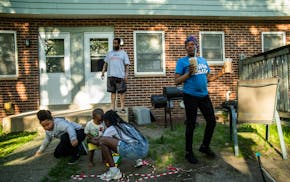When Susan Walsh and Leah Amerson came upon the stray, injured cat lying still in the marshy backyard of a Coon Rapids home late last month, they thought he was dead.
The long-haired tabby eventually named "Sule" — after Walsh and Amerson's first names — was dehydrated and anemic with infected wounds on his side. It would be the second time he was rescued, five days after he was humanely trapped by a resident and turned over to Coon Rapids police on March 16.
That time, an officer released Sule into the woods after the local Animal Humane Society refused to take the cat, which was not microchipped, saying a veterinarian was unavailable and it wasn't their policy to accept feral cats.
When Amerson and Walsh learned of Sule's fate, they spent days searching for him.
"It was just heartbreaking," Amerson said. "And the residents that trapped him, they also knew he was injured. They said he was in bad shape. They didn't expect that he was going to be picked up and dropped off in the woods."
The saga of Sule, who is now recovering with veterinary intervention in foster care, has sparked fervor over how police handle feral cats in the north metro suburb and reignited a push for trap, neuter and return (TNR) programs.
However, both the Animal Humane Society and Coon Rapids Police Department say their hands are mostly tied when it comes to intervening in the area's population of feral cats, a fraction of the estimated 300,000 to 1 million living in the Twin Cities.
The problem was underscored earlier this month, when 59-year-old Jacqueline Marie Broberg was charged with felony animal cruelty after 21 cats were found dead and more than 80 others were rescued from her home in Coon Rapids.
Sule's case triggered an online petition dubbed "Stop allowing Police to dump injured cats!" that critically laid out the Coon Rapids police and Humane Society's handling of feral cats and garnered more than 950 signatures.
The petition contended in part that not all lost cats are feral, and in cases like Sule's, "it's certainly not only a terrifying experience, but often a fatal one. In an unfamiliar territory with no familiar food source or shelter, as well as the increase in predators present in a wildlife reserve, this decision was certainly malicious and cruel."
As a result, the department announced on March 25 that it "will no longer accept or relocate cats that do not have a microchip or collar. Instead, we will encourage residents to work with private rescue organizations to discuss options for the animal."
The Facebook post was met with more than a thousand comments, most of them angry.
"How long did it take to determine if the cat was feral or not?" one user wrote. "Those of us with experience with cats know that there's no quick way to tell, especially if the cat was in a carrier and you were just looking at the cat trying to decide if feral or not."
In a police report, the officer stated the Animal Humane Society could not take the cat, so they drove to a secluded place to relocate it. They noted the cat was injured.
Feral cat challenge
Coon Rapids Deputy Chief Adam Jacobson said police officers don't trap free-roaming or feral cats, also called community cats, but people who trap them and call the police are given the necessary resources to care for them.
The department has a contract with the Animal Humane Society to help relocate stray or lost pets, but the organization does not accept feral cats. He said cases like this are rare for officers to deal with.
"This is an incident in a neighborhood," Jacobson said, referring to Sule's case. "This isn't something we are dealing with on a daily, weekly or even monthly basis."
According to a data request made by Coon Rapids resident Charlene Gruber, between Sept. 20, 2024, and March 21, 2025, there were 10 cases involving loose or stray cats taken in by police. Of those, six were released.
Dr. Graham Brayshaw, director of animal services at the Humane Society, said the organization does not take in feral or unsociable and uncared for cats because a shelter is not the right place for them.
The chance of rehabilitation to make a feral cat adoptable is slim, Brayshaw said. Containment during the mandated five-day stray period is also stressful for feral cats as they don't respond well to captivity.
Brayshaw said the Humane Society has asked cities not to bring them feral cats. He said if an animal is injured and a veterinarian is not on staff then the shelter recommends police work with another rescue or emergency veterinarian.
"If an animal ends up coming in appearing social and actually ends up being feral we'll make the best decision we can for that animal," Brayshaw said. "It's usually sterilize and return."
Trap, neuter and return
Jacky Wilson, a coordinator for the local nonprofit cat rescue Bitty Kitty Brigade, said Coon Rapids police dropping unsterilized cats off at Bunker Hills Regional Park worsens the problem.
She recommends TNR, a common practice among cat rescue organizations and advocates trying to control the feral cat population.
Financial barriers have started making TNR unsustainable. In 2024, the Humane Society started charging $75 per cat to sterilize.
The neighborhoods with the largest groups of feral cats don't have access to TNR because of finances, time, lack of transportation, language barriers and limited internet access, Wilson said.
"It's a struggle for us," she said. "This is the solution, this is what you can do."
Cities understand the problem, Wilson said, but they don't want to change their ordinances to help solve it. Some places, like Edina, have laws that prohibit trapping cats.
The Bitty Kitty Brigade works with cities and local shelters to encourage TNR programs. The organization also teaches residents how to catch, hold, and transport feral cats, where to affordably get the cats sterilized and how to release them.
"The cats that are out there are the kittens we didn't find," Wilson said. Every year the brigade takes in more than a thousand kittens.
St. Francis of Assisi Animal Rescue is caring for Sule as he recovers from his injuries. An online fundraiser organized to help the rescue pay for Sule's vet bills raised $2,550.
Wilson said Sule doesn't act feral, and she believes he may be someone's lost pet.
In an April 10 Facebook update on Sule's improving health, a brief video showed him playing with a toy and affectionately receiving a pet on the head. He was cleared that day for neuter surgery.

Minneapolis council to consider new 2% fee on hotel rooms to boost tourism
White House blasts Twin Cities as 'sanctuary jurisdictions' after immigrant's fatal crash

Meteorologist Wren Clair lands new job at KARE-TV

